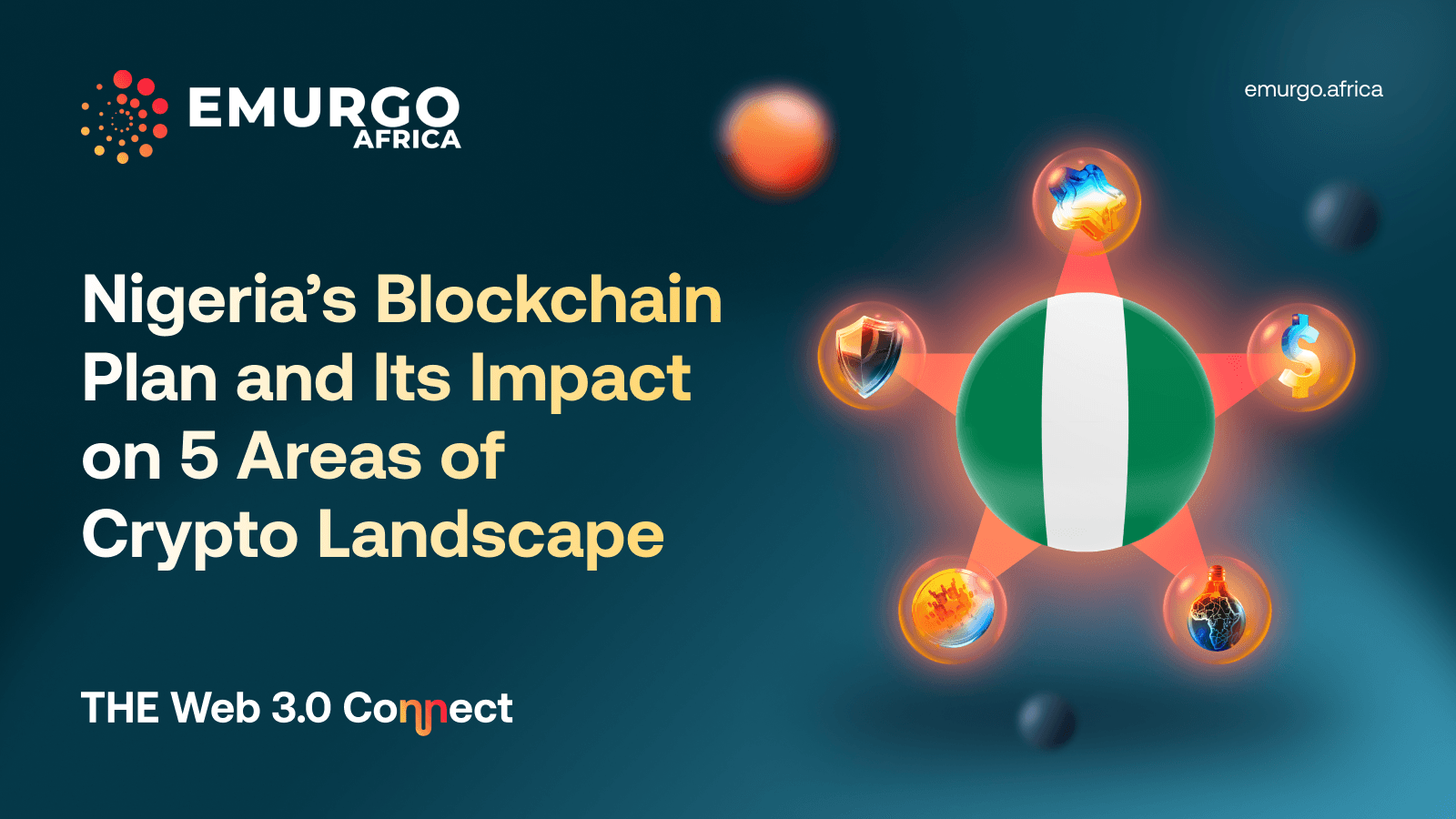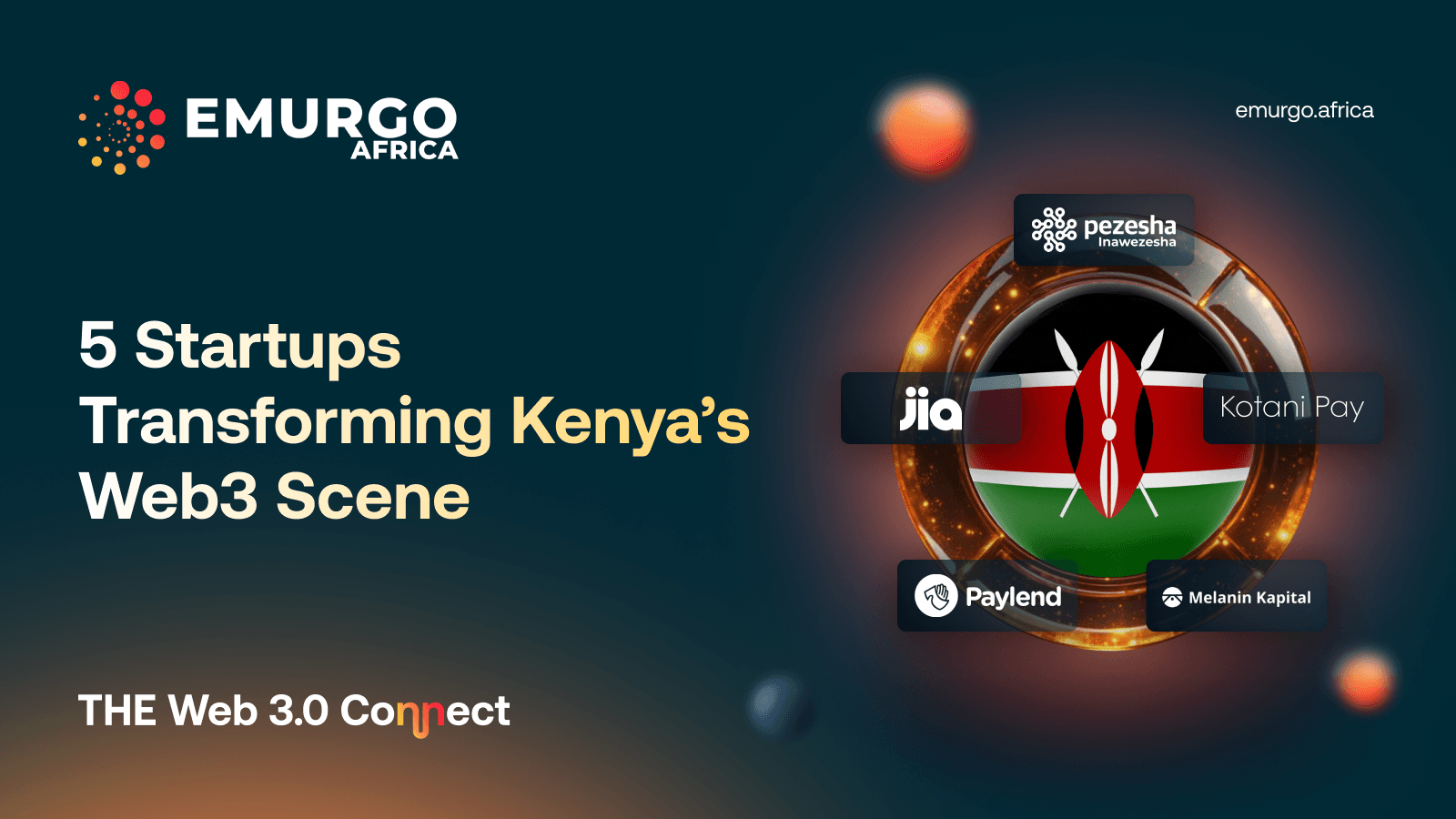By Shogo Ishida and Yosuke Yoshida, Co-CEOs, EMURGO Africa
Nigeria has emerged as one of the most active countries in the world for cryptocurrency usage, ranking among the top in peer-to-peer (P2P) trading volumes. The country tops Africa in Web3 potential, and has been making strides to make crypto and blockchain mainstream in the past two years. However, there are still stumbling blocks along the way.
Key takeaways:
- Nigeria is one of the few countries in Africa with a state blockchain policy.
- Nigeria is laying plans for a homegrown blockchain network.
- The government plans to introduce taxes on crypto transactions.
- There are a number of hurdles to be overcome for Nigeria to achieve significant progress in blockchain adoption.

Nigeria’s journey to raise crypto and blockchain adoption
Nigeria's Securities and Exchange Commission (SEC) published a 54-page document in May last year containing regulations for digital assets. This signaled Africa's most populous country was trying to find a middle ground between an outright ban on crypto assets and their unregulated use.
To capitalize on blockchain’s potential and improve uptake, the government published its National Blockchain Policy the same month, aimed at integrating blockchain technology into various sectors of the economy. If executed effectively, this plan could significantly reshape Nigeria's digital landscape.
A pivotal moment in this journey was a decision by the Central Bank of Nigeria (CBN) to lift restrictions on banks and financial institutions facilitating cryptocurrency transactions in December 2023. This move signaled a shift from resistance to acceptance, recognizing the futility of trying to curb the growing appetite for digital assets among Nigerians.
In July this year, the Nigerian government announced plans to create its own blockchain, dubbed ‘Nigerium’ to secure the safety of data. The plan, revealed by the Director General, National Information Technology Development Agency (NITDA), Kachifu Abdullahi, aims to achieve data sovereignty so private data processing won’t be subject to the decisions of foreign co-developers.
On August 14, 2024, Nigeria’s Lagos state government announced an ambitious plan to tokenize real estate, leveraging blockchain technology to enhance transparency, efficiency and ease of transfer in property transactions.
Three days later, the government, through the Federal Inland Revenue Service, revealed that it would be seeking the support of parliament to present a bill for taxing the crypto industry. This is awaiting approval by parliament by September this year.
One of the key provisions in the proposed tax law is the introduction of a 7.5% value-added tax (VAT) on cryptocurrency transactions.

However, despite this enthusiasm, the broader adoption of blockchain technology and cryptocurrencies in Nigeria has faced significant hurdles.
Here are 5 key areas where Nigeria can make substantial changes to boost blockchain and crypto adoption across the nation:
1. Regulatory clarity and consistency
Nigeria's relationship with cryptocurrencies has been complex. On one hand, the Central Bank of Nigeria (CBN) imposed a ban on banks facilitating crypto transactions in February 2021, citing concerns over fraud, money laundering, and other illegal activities.
On the other, the Nigerian government has shown an interest in blockchain technology for economic development, evidenced by the introduction of the eNaira, the country's central bank digital currency (CBDC). The ban on banks has now been lifted and plans are underway to regulate crypto.
Needed change
To improve blockchain and crypto uptake, Nigeria should consider establishing a clear and consistent regulatory framework that distinguishes between legitimate blockchain activities and potential risks. This involves updating existing financial regulations to accommodate new technologies, providing guidelines for crypto businesses, and ensuring that regulations are enforced uniformly across the board. A well-defined legal framework will encourage innovation and investment in the blockchain space while protecting consumers from fraud and exploitation.
This requires the involvement of key stakeholders—including crypto exchanges, blockchain developers, financial institutions, and consumer protection groups—in the regulatory drafting process to ensure that the rules are practical and effective.
Instead of imposing sudden bans or restrictions, the government needs to adopt a phased approach that gradually introduces regulations, allowing businesses and consumers time to adapt.
Collaboration with international bodies and other countries will be key to aligning its regulations with global best practices, making it easier for Nigerian businesses to operate globally.
2. More and more financial inclusion
A significant portion of Nigeria's population remains unbanked or underbanked, lacking access to traditional financial services. In 2023, only 64% of adults had a formal financial service compared to a 95% target by 2024.
Cryptocurrencies and blockchain technology offer an alternative means of financial inclusion, enabling individuals to participate in the global economy without relying on traditional banking infrastructure.
Needed change
The national blockchain strategic plan is expected to prioritize initiatives that leverage blockchain technology to enhance financial inclusion. This includes supporting decentralized finance (DeFi) platforms, which provide services such as lending, borrowing, and savings without the need for intermediaries. Additionally, blockchain-based identity systems have potential to help the unbanked establish a digital identity, allowing them to access financial services more easily.
The government should think of partnering with fintech startups to develop DeFi platforms tailored to the needs of the unbanked population, ensuring that these platforms are user-friendly and accessible to people with limited digital literacy.
Implementing blockchain-based digital identity programs that allow individuals to securely verify their identity online, enabling them to access a wide range of services, from banking to healthcare, should be a priority.
To maximize the impact of these initiatives, awareness plays a big role. The government should lead from the front on launching educational campaigns to raise awareness about the benefits of blockchain and how to use these technologies safely and effectively.
3. Encouraging local innovation
Nigeria has a vibrant tech ecosystem, with a growing number of startups and developers exploring blockchain technology. However, the country still faces challenges in terms of access to resources, funding, and mentorship, which has been hindering the development of innovative blockchain solutions.
Needed change
To foster local innovation and talent development in the blockchain space, Nigeria's state blockchain plan should focus on creating an enabling environment for startups and developers. This includes providing access to funding, technical resources, and mentorship, as well as fostering collaboration between industry, academia, and government.
More efforts are needed to support blockchain-focused incubators and accelerators that provide startups with the resources they need to grow and succeed. These programs should offer funding, mentorship, technical training, and networking opportunities.
By partnering with universities and tech companies, the government could create research and development (R&D) hubs that focus on blockchain technology. These hubs could serve as centers of excellence, driving innovation and providing a pipeline of skilled talent.
To stimulate creativity and problem-solving, the government should join the private sector in organizing national blockchain hackathons and competitions, offering prizes and recognition to the most promising projects.
4. Building a robust blockchain infrastructure
For blockchain technology to be widely adopted, it requires a robust and scalable infrastructure. Creating the ‘Nigerium’ blockchain network is a step in the right direction but critical infrastructure includes not only the underlying technology stack such as blockchain networks, smart contracts, and consensus mechanisms, but also the physical infrastructure such as electricity, internet connectivity and secure data centers needed to support these systems.
Needed change
Nigeria's ‘Nigerium’ blockchain platform could be a robust blockchain infrastructure that can support a wide range of applications, from financial services, land records, education to supply chain management. This involves both improving the country's physical infrastructure, bearing in mind that Nigeria has always struggled with power blackouts, and investing in the development of blockchain networks and tools that are tailored to the Nigerian context.
Stronger partnerships with telecom companies and energy providers will be key to improving internet connectivity and electricity access in rural and underserved areas, ensuring that all Nigerians can benefit from blockchain technology.
Local development of local blockchain networks needs more government support. They need to be optimized for the country's needs, such as networks that offer low transaction fees and high scalability.
Encouraging open-source development of blockchain tools and platforms could help drive innovation and ensure that these technologies are accessible to a broad range of users.
5. Enhancing consumer protection
While blockchain technology offers numerous benefits, it also presents risks, particularly in terms of security and consumer protection. Cyberattacks, scams, and fraud are prevalent in the crypto space, and many Nigerians have fallen victim to these threats.
Needed change
To build trust in blockchain and crypto, Nigeria could prioritize consumer protection and security. This includes implementing measures to safeguard users' funds, protect their data, and educate them about the risks and best practices for using blockchain technology.
Nigeria needs to establish a regulatory body tasked with overseeing the blockchain and crypto sectors, ensuring that businesses adhere to best practices in terms of security and consumer protection.
Developing and enforcing security standards for blockchain platforms and crypto exchanges could help prevent hacks and fraud, protecting users' assets.
To empower consumers, the government educational initiatives that teach people how to use blockchain technology safely, recognize potential scams, and protect their private keys and digital assets, will be imperative.

Nigeria's state blockchain plan represents a significant opportunity to transform the country's digital economy and position it as a leader in the global blockchain space. By focusing on regulatory clarity, financial inclusion, innovation, infrastructure, and consumer protection, Nigeria can create an environment that encourages the adoption of blockchain technology and cryptocurrencies, ultimately driving economic growth and improving the lives of its citizens.
With the right policies and initiatives in place, Nigeria can not only overcome the challenges it currently faces but also unlock the full potential of blockchain technology, creating new opportunities for businesses, consumers, and the country as a whole.
DISCLAIMER: The information in this content (website or other form) does not represent an offer or commitment to provide any product or service. The analysis, opinions and estimates expressed in this content are those of the respective authors, and may differ from those of EMURGO Africa and/or other EMURGO Africa employees and affiliates. Copying, re-publishing or using this material or any of its contents for any other purpose is strictly prohibited without prior written consent from EMURGO Africa.




